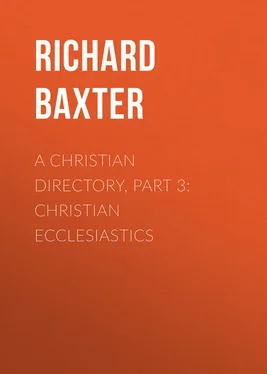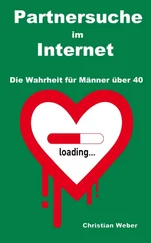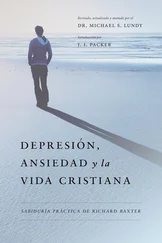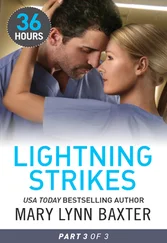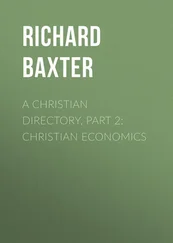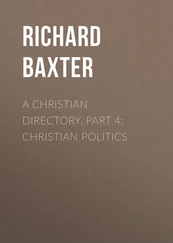Richard Baxter - A Christian Directory, Part 3 - Christian Ecclesiastics
Здесь есть возможность читать онлайн «Richard Baxter - A Christian Directory, Part 3 - Christian Ecclesiastics» — ознакомительный отрывок электронной книги совершенно бесплатно, а после прочтения отрывка купить полную версию. В некоторых случаях можно слушать аудио, скачать через торрент в формате fb2 и присутствует краткое содержание. Жанр: foreign_antique, foreign_prose, на английском языке. Описание произведения, (предисловие) а так же отзывы посетителей доступны на портале библиотеки ЛибКат.
- Название:A Christian Directory, Part 3: Christian Ecclesiastics
- Автор:
- Жанр:
- Год:неизвестен
- ISBN:нет данных
- Рейтинг книги:3 / 5. Голосов: 1
-
Избранное:Добавить в избранное
- Отзывы:
-
Ваша оценка:
- 60
- 1
- 2
- 3
- 4
- 5
A Christian Directory, Part 3: Christian Ecclesiastics: краткое содержание, описание и аннотация
Предлагаем к чтению аннотацию, описание, краткое содержание или предисловие (зависит от того, что написал сам автор книги «A Christian Directory, Part 3: Christian Ecclesiastics»). Если вы не нашли необходимую информацию о книге — напишите в комментариях, мы постараемся отыскать её.
A Christian Directory, Part 3: Christian Ecclesiastics — читать онлайн ознакомительный отрывок
Ниже представлен текст книги, разбитый по страницам. Система сохранения места последней прочитанной страницы, позволяет с удобством читать онлайн бесплатно книгу «A Christian Directory, Part 3: Christian Ecclesiastics», без необходимости каждый раз заново искать на чём Вы остановились. Поставьте закладку, и сможете в любой момент перейти на страницу, на которой закончили чтение.
Интервал:
Закладка:
Direct. VI. Be sure that you lose not the fear of God, and the tenderness of your consciences. When these are lost, your understanding, and sense, and life are lost; and you will not stick at the greatest wickedness; nor know when you have done it, what you did. If faith see not God continually present, and foresee not the great approaching day, perjury or any villany will seem tolerable, for worldly ends: for when you look but to men's present case, you will see that "the righteous and the wise, and their works, are in the hands of God; no man knoweth love or hatred by all that is before them. All things come alike to all; there is one event to the righteous, and to the wicked; to the good, and to the clean, and to the unclean; to him that sacrificeth, and to him that sacrificeth not: as is the good, so is the sinner; and he that sweareth, as he that feareth an oath," Eccles. ix. 1, 2. But in the end, men "shall discern between the righteous and the wicked," Mal. iii. 18. Therefore it is the believing foresight of the end, that by preserving the fear of God and tenderness of conscience, must save you from this, and all other heinous sin.
Direct. VII. Be not bold and rash about such dreadful things as vows. Run not as fearlessly upon them as if you were but going to your dinner; the wrath of God is not to be jested with. Usque ad aras , was the bounds even of a heathen's kindness to his friend. Meddle with oaths with the greatest fear, and caution, and circumspection. It is terrible here to find that you were mistaken, through any temerity, or negligence, or secret seduction of a carnal interest.
Direct. VIII. Especially be very fearful of owning any public doctrine, or doing any public act, which tendeth to harden others in their perjury, or to encourage multitudes to commit the sin. 63 63 Nunc nunc qui fœdera rumpit, Ditatur: Qui servat eget. Claudian.
To be forsworn yourselves is a dreadful case; but to teach whole nations or churches to forswear themselves, or to plead for it, or justify it as a lawful thing, is much more dreadful. And though you teach not or own not perjury under the name of perjury, yet if first you will make plain perjury to seem no perjury, that so you may justify it, it is still a most inhuman, horrid act. God knoweth I insult not over the papists, with a delight to make any christians odious! but with grief I remember how lamentably they have abused our holy profession, while not only their great doctors, but their approved general council at the Lateran under Pope Innocent the Third, in the third canon hath decreed that the pope may depose temporal lords from their dominions, and give them unto others, and discharge their vassals from their allegiance and fidelity, if they be heretics, or will not exterminate heretics (even such as the holy men there condemned were, in the pope's account). To declare to many christian nations, that it is lawful to break their oaths and promises to their lawful lords and rulers, or their vows to God, and to undertake, by defending or owning this, to justify all those nations that shall be guilty of this perjury and perfidiousness, oh what a horrid crime is this! what a shame even unto human nature! and how great a wrong to the christian name!
Direct. IX. Understand and remember these following rules, to acquaint you how far a vow is obligatory: which I shall give you for the most part out of Dr. Sanderson, because his decisions of these cases are now of best esteem.
Rule I. The general rule laid down Numb. xxx. 2, 3, doth make a vow, as such, to be obligatory, though the party should have a secret equivocation or intent, that though he speak the words to deceive another, yet he will not oblige himself. Such a reserve not to oblige himself hindereth not the obligation, but proveth him a perfidious hypocrite. Dr. Sanderson, p. 23, Juramentum omne ex sua natura est obligatorium: ita ut si quis juret non intendens se obligare, nihilominus tamen suscipiendo juramentum ipso facto obligetur : that is, If he so far understand what he doth, as that his words may bear the definition of an oath or vow; otherwise if he speak the words of an oath in a strange language, thinking they signify something else, or if he speak in his sleep, or deliration, or distraction, it is no oath, and so not obligatory.
Rule II. Those conditions are to be taken as intended in all oaths, (whether expressed or no,) which the very nature of the thing doth necessarily imply 64 64 See Dr. Sanders. p. 47, and 197.
(unless any be so brutish as to express the contrary). And these are all reducible to two heads: 1. A natural, and, 2. A moral impossibility. 1. Whoever sweareth to do any thing, or give any thing, is supposed to mean, If I live; and if I be not disabled in my body, faculties, estate; if God make it not impossible to be, &c. For no man can be supposed to mean, I will do it whether God will or not, and whether I live or not, and whether I be able or not. 2. Whoever voweth or sweareth to do any thing, must be understood to mean it, If no change of providence make it a sin; or if I find not, contrary to my present supposition, that God forbiddeth it. For no man that is a christian is to be supposed to mean when he voweth, I will do this, though God forbid it, or though it prove to be a sin; especially when men therefore vow it, because they take it to be a duty. Now as that which is sinful is morally impossible, so there are divers ways by which a thing may appear or become sinful to us. (1.) When we find it forbidden directly in the word of God, which at first we understood not. (2.) When the change of things doth make that a sin, which before was a duty; of which may be given an hundred instances; as when the change of a man's estate, of his opportunities, of his liberty, of his parts and abilities, of objects, of customs, of the laws of civil governors, doth change the very matter of his duty.
Quest. But will every change disoblige us? If not, what change must it be? seeing casuists use to put it as a condition in general, rebus sic stantibus . Answ. No: it is not every change of things that disobligeth us from the bonds of a vow. For then vows were of no considerable signification. But, 1. If the very matter that was vowed, or about which the vow was, do cease, cessante materia, cessat obligatio : 65 65 Cicero de Leg. lib. 1. proveth that right is founded in the law of nature, more than in man's laws; else, saith he, men may make evil good, and good evil, and make adultery, perjury, &c. just by making a law for them.
as if I promise to teach a pupil, I am disobliged when he is dead. If I promise to pay so much money in gold, and the king should forbid gold and change his coin, I am not obliged to it. 2. Cessante termino vel correlato, cessat obligatio : If the party die to whom I am bound, my personal obligation ceaseth. And so the conjugal bond ceaseth at death, and civil bonds by civil death. 3. Cessante fine, cessat obligatio : If the use and end wholly cease, my obligation, which was only to that use and end, ceaseth. As if a physician promise to give physic for nothing for the cure of the plague, to all the poor of the city; when the plague ceaseth, his end, and so his obligation, ceaseth. 4. Cessante persona naturali relata, cessat obligatio personalis : When the natural person dieth, the obligation ceaseth. I cannot be obliged to do that when I am dead, which is proper to the living. The subject of the obligation ceasing, the accidents must cease. 5. Cessante relatione vel persona civili, cessat obligatio talis, qua talis : The obligation which lay on a person in any relation merely as such, doth cease when that relation ceaseth. A king is not bound to govern or protect his subjects if they traitorously depose him, or if he cast them off, and take another kingdom (as when Henry III. of France left the kingdom of Poland): nor are subjects bound to allegiance and obedience to him that is not indeed their king. A judge, or justice, or constable, or tutor, is no longer bound by his oath to do the offices of these relations, than he continueth in the relation. A divorced wife is not bound by her conjugal vow to her husband as before, nor masters and servants, when their relations cease; nor a soldier to his general by his military sacrament, when the army is disbanded, or he is cashiered or dismissed.
Интервал:
Закладка:
Похожие книги на «A Christian Directory, Part 3: Christian Ecclesiastics»
Представляем Вашему вниманию похожие книги на «A Christian Directory, Part 3: Christian Ecclesiastics» списком для выбора. Мы отобрали схожую по названию и смыслу литературу в надежде предоставить читателям больше вариантов отыскать новые, интересные, ещё непрочитанные произведения.
Обсуждение, отзывы о книге «A Christian Directory, Part 3: Christian Ecclesiastics» и просто собственные мнения читателей. Оставьте ваши комментарии, напишите, что Вы думаете о произведении, его смысле или главных героях. Укажите что конкретно понравилось, а что нет, и почему Вы так считаете.
